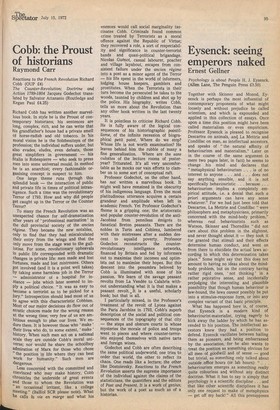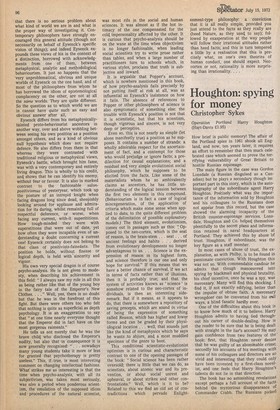Eysenck: seeing emperors naked
Ernest Gellner
Psychology is about People H. J. Eysenck. (Allen Lane, The Penguin Press £3.50) Together with Skinner and Monod, Eysenck is perhaps the most influential of contemporary proponents of what might loosely and without prejudice be called scientism, and which is expounded and applied in this collection of essays. Once upon a time this position might have been called materialism or even empiricism. Professor Eysenck is pleased to recognise Descartes on animals, and La Mettrie and Condillac on man, as intellectual ancestors, and speaks of "the natural affinity of behaviourism and materialism." Later on in the course of the same argument (a mere two pages later, in fact) he seems to change his mind and declares that "metaphysical behaviourism . . . is of no interest to anyone . . . and . . . does not say anything sensible, and it is not specifically behaviouristic . . . because . . . behaviourism implies a completely empirical attitude, i.e. a denial that such a priori arguments can have any sense whatever." For we had just been told that Descartes, La Mettrie and Condillac "were philosophers and metaphysicians, primarily concerned with the mind-body problem," whereas real behaviourists such as Watson, Skinner and Thorndike "did not care about this problem in the slightest, and never thought about it — they took it for granted that stimuli and their effects determine human conduct, and went on from there to elucidate the actual laws according to which this determination takes place." Some might say that this does not amount to having no ideas about the mindbody problem, but on the contrary having rather rigid ones, 'not thinking' in a rather pejorative sense, and incidentally prejudging the interesting and plausible possibility that though human behaviour is law-bound, the laws cannot possibly be put into a stimulus-response form, or into any complex variant of that basic principle.
What has happened here is, of course, that Eysenck is a modern kind of behaviourist-materialist, trying eagerly to kick away the ladder by which he has ascended to his position. The intellectual ancestors knew they had a position to defend. Eysenck vacillates between hailing them as pioneers, and being embarrassed by the association, for he also wants to treat the position as something obvious for all men of goodwill and of sense — good but trivial, as something only talked about outside office hours (or lab hours): " . • . behaviourism emerges as something really quite colourless and without any distinct doctrine. What it has to say is simply that psychology is a scientific discipline . . . and that like other scientific disciplines it has only one request to make of metaphysics — get off my back!" All this presupposes that there is no serious problem about what kind of world we are in and what is the proper way of investigating it. Contemporary philosophers have strongly encouraged this general attitude (though not necessarily on behalf of Eysenck's specific vision of things); and indeed Eysenck expounds these views of his in the context of a distinction, borrowed with acknowledgments from one of them, between metaphysical, analytic and methodological behaviourism. It just so happens that the very unproblematical, obvious and unique worlds of Eysenck on the one hand, and of most of the philosophers from whom he has borrowed the idiom of epistemological complacency on the other, are not at all the same worlds. They are quite different. So the question as to which world we are in cannot have quite such an easy and obvious answer after all, Eysenck differs from his metaphysicallytainted proto-behaviourist ancestors in another way, over and above wobbling between seeing his own position as a position amongst others, and as a kind of obvious null hypothesis which does not require defence. He also differs from them in that whereas they were contrasted with traditional religious or metaphysical views, Eysenck's battle, which brought him fame, was with a very contemporary and entirely living dragon. This is wholly to his credit, and shows that he can identify his enemy, without fear or favour. It is also in marked contrast to the fashionable salonpositivismus of yesteryear, which took up the posture of an intrepid knight when facing dragons long since dead, sheepishly looking around for applause and admiration for its daring, whilst remaining full of respectful deference, or worse, when facing any current, with-it superstitions. How tough-minded they were with superstitions that were out of date, yet how often they were incapable even of un derstanding a doubt concerning a current one! Eysenck certainly does not belong to that class of positivists-faineants. The position he holds, without finesse or logical depth, is held with sincerity and vigour.
His own very special dragon is of course psycho-analysis. He is not given to modesty, when describing his achievement in this field: " I always saw my role in all this as being rather like that of the young boy in the fairy tale of the Emperor's New Chithes. . . • " Well, yes, there is no doubt but that he was in the forefront of this fight. But there were others too who felt that nothing is quite as superficial as depth psychology. It is an exaggeration to say that "at one time nearly everyone thought that the Emperor did in fact have on the most gorgeous raiments."
He tells us not merely that he was the brave child who disclosed the Emperor's nudity, but also that in 'consequence it is now generally recognised: " . . nowadays many young students take it more or less for granted that psychotherapy is pretty useless." This, if .true, is most interesting comment on changing intellectual fashions. What strikes me as interesting is that the time when psycho-analysis, with all its subjectivism, was taken most seriously, was also a period when ponderous scientism, the emulation of the supposed idiom and procedures of the natural scientist, was most rife in the social and human sciences. It was almost as if the hot intimacy of the one compensated for the cold, impersonality affected by the other. It is curious that psycho-analysis should be on the wane at the time when objectivism is no longer fashionable, when leading social scientists try to write prose rather than tables, and when a large number of practitioners turn to schools which, in various styles, proclaim that truth is subjective and inward.
It is arguable that Popper's account, which is nowhere mentioned in this book, of how psycho-analysis fails precisely by not putting itself at risk at all, was as influential as Eysenck's insistence on how it fails. The absence of references to Popper or other philosophers of science is also symptomatic of something else: the trouble with Eysenck's position is not that it is scientistic, but that his scientism, though vigorous and sincere, is not very deep or perceptive.
Even so, this is not nearly as simple (let alone manifestly true) a position as he supposes. It contains a number of strands: a wholly admirable respect for the ascertainment of fact, and a contempt for those who would prejudge or ignore facts; a predilection for causal explanations; and a residual and very simple evolutionist social philosophy, which he supposes to be elicited from the facts. Like some of the materialists whom he so ambivalently claims as ancestors, he has little understanding of the logical tension between the first two elements in this compound. (Behaviourism is in fact a case of logical miscegeneration, of the application of criteria which make some sense when applied to data, to .the quite different problem of the delimitation of possible explanatory models.) The third element, evolutionism, comes out in passages such as this: "opposed to the neo-cortex, which is the seat of reason, is the brain-stem . . . seat . . . of ancient feelings and habits . . . derived from evolutionary developments no longer advantageous to us. . . . Science is the expression of reason in its highest form, and science therefore is our one and only hope for survival." If this means that we have a better chance of survival, if we act in terms of facts rather than of illusions, then it is probably true; and that the system of activities known as ' science ' is somehow related to the neo-cortex of individuals, is then an interesting sideremark. But if it means, as it appears to do, that there is somewhere a repository of saving precepts, which are sound in virtue of being the expression of something called Reason, which has higher and lower forms and can be graded by their physiological location . . . well, that sounds just like the kind of metaphysics which he says he wants to abjure, and a most muddled specimen of the genre to boot.
This conditional scientistic-evolutionist optimism is in curious and characteristic contrast to one of the opening passages of the book: " Social science has been rather oversold; there is little that we can do, as scientists, about atomic war and its prevention, or about social unrest and upheaval, or about strikes and other confrontations." Well, which is it to be? Related to this we find an old set of contradictions which pervade Enlight enment-type philosophy: a conviction that it is all really simple, provided you just attend to the facts as they really are (heed Nature, as they used to say); followed by exasperation at the way people will follow their irrational attitudes rather than heed facts; and this in turn tempered a little by a realisation that this is precisely what, on one's own theories of• human conduct, one should expect. Neocortex or not, rationality is more surprising than irrationality. . . .











































 Previous page
Previous page